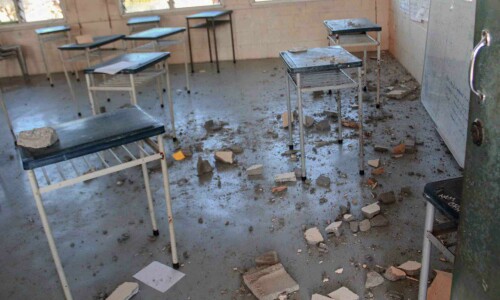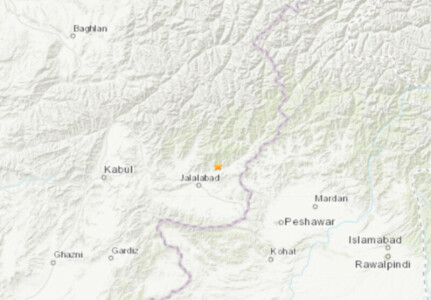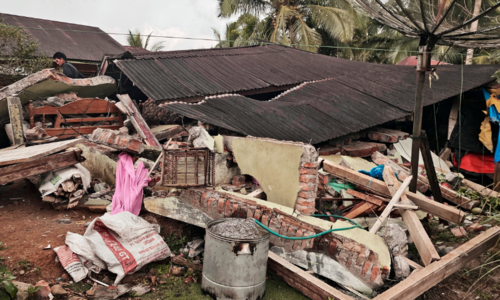A shallow 5.6-magnitude earthquake killed at least 162 people, with hundreds injured and others missing, when it toppled buildings and triggered landslides on Indonesia’s main island of Java on Monday, officials said.
Doctors treated patients outdoors after the quake, which was felt as far away as the capital Jakarta, left hospitals in the West Java town of Cianjur without power for several hours.
“I regret to inform that 162 are dead [and] 326 are injured with most of them sustained fractures from being crushed in ruins,” Ridwan Kamil, governor of the worst-hit province West Java, told a press conference in a video seen by AFP.
He said most of the victims were children.
Adam, the spokesman for the local administration in Cianjur town, who like many Indonesians goes by one name, confirmed the toll to AFP.
Indonesia’s national disaster mitigation agency, BNPB, still lists the toll at 62.
Due to miscounting, officials offered wildly fluctuating death tolls after an Indonesian stadium disaster last month.
The BNPB said 25 people remained trapped under the rubble as the rescue mission stretched into the night.
The agency said more than 2,000 houses were damaged and Kamil said more than 13,000 people were taken to evacuation centres.
“You can see it yourself, some got their heads, feet sewn outdoors. Some got stressed and started crying,” Kamil said.
Kamil said power had been partially restored by the evening, without specifying if that meant by generators or connection to a power grid.
The afternoon quake was centred in the Cianjur region and local authorities earlier said as many as 700 had been wounded, warning the death toll could rise further.
“Because there are still a lot of people trapped on the scene, we assume injuries and fatalities will increase over time,” Kamil said as ambulance sirens blared in the background.
Agus Azhari, 19, was with his elderly mother in the family home when their living room was destroyed within seconds, parts of the walls and roof collapsing around them.
“I pulled my mother’s hand, and we ran outside,” he said. “I heard people screaming for help from all around me,” Azhari told AFP.
The majority of deaths were counted in one hospital, the head of Cianjur’s local administration Herman Suherman said, with most of the victims killed in the ruins of collapsed buildings.
He told Indonesian media the town’s Sayang hospital had no power after the quake, leaving doctors unable to operate on victims immediately.
More health workers were urgently needed due to the overwhelming number of patients, he said.
Locals rushed victims to the hospital in pickup trucks and on motorbikes, according to footage obtained by AFP.
They were placed in front of the facility as residents spread a tarpaulin on the road for the bodies.
At another facility, Cimacan hospital, green tents were erected outside for makeshift treatment, according to an AFP reporter at the scene.
‘Emergency state’
Victims arrived covered in blood, while parents looked for their children.
Kamil, the governor, said multiple landslides had cut off road access to some areas and bulldozers were being used to reopen them.
Shops, a hospital and an Islamic boarding school in the town were severely damaged, according to Indonesian media.
Collapsed buildings and debris lined the streets in Cianjur. The town is situated in a hilly area where many houses are built with a mixture of mud and concrete.
“We are currently handling people who are in an emergency state in this hospital. The ambulances keep on coming from the villages to the hospital,” Suherman said.
“There are many families in villages that have not been evacuated,” he added.
Cianjur police chief Doni Hermawan told Metro TV that authorities had rescued a woman and a baby from a landslide but a third person they found had died of their injuries.
Jakarta rattled
French President Emmanuel Macron was the first world leader to offer his condolences.
“Indonesia was hit this morning by an earthquake of destructive and deadly force. Thoughts for all the victims,” he wrote.
Prime Minister Shehbaz Sharif said he was “saddened by the tragic loss of precious lives” and Pakistan offered its “heartfelt condolences and most sincere sympathies” to Indonesia.
Foreign Minister Bilawal Bhutto Zardari extended his condolences and prayed for the quake’s victims and their families.
Canadian Prime Minister Justin Trudeau sent condolences and said Ottawa “stands ready to help in any way”.
Indonesian President Joko Widodo is yet to respond to the quake.
Indonesia’s meteorological agency said it recorded 62 aftershocks in Cianjur after the quake, with magnitudes ranging from 1.8 to 4.
There were no reports of casualties or major damage in Jakarta, a three-hour drive away.
Mayadita Waluyo, a 22-year-old lawyer, described how panicked workers ran to building exits in Jakarta as the quake struck.
“I was working when the floor under me was shaking. I could feel the tremor clearly. I tried to do nothing to process what it was but it became even stronger and lasted for some time,” she said.
“I feel a bit dizzy now and my legs are also a bit cramped because I had to walk downstairs from the 14th floor,” she added.
Hundreds of people were waiting outdoors after the quake, including some wearing hard hats to protect themselves from falling debris, an AFP reporter there said.
Indonesia experiences frequent seismic and volcanic activity due to its position on the Pacific “Ring of Fire”, where tectonic plates collide.
A 6.2-magnitude quake that shook Sulawesi island in January 2021 killed more than 100 people and left thousands homeless.



















































